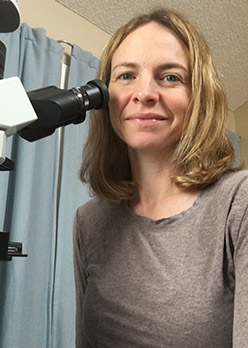Investigator:
Annie Hiniker, MD, PhD
Name of Institution:
University of California San Diego, San Diego, CA
Project Title:
Elucidating pathways of LRRK2 turnover as therapeutic targets for Parkinson’s disease
Investigator Bio:
Dr. Hiniker graduated magna cum laude with highest honors in Biology from Harvard University and earned her MD and PhD from the University of Michigan. She performed her anatomic pathology residency, neuropathology fellowship, and a postdoctoral fellowship at the University of California San Francisco, where she focused on neurodegenerative diseases, particularly Parkinson’s disease (PD). She recently joined the faculty of University of California San Diego (UCSD), in the Department of Pathology as an Assistant Professor. Her research lab is studying the mechanisms of LRRK2-associated PD. She also serves as the neuropathologist for the UCSD Alzheimer’s Disease Research Center and the San Diego VA Hospital.
Objective:
To identify the cellular pathways leading to destruction of the protein LRRK2, which has been implicated as a key player in both genetic and sporadic PD.
Background:
Genetic mutation of the protein LRRK2 is the most common genetic cause of both sporadic and familial PD. LRRK2 is a kinase, an enzyme that places phosphate group on molecules, a critical cellular process. Mutations that cause PD increase LRRK2’s kinase activity. Because of this, LRRK2 kinase inhibitors have been developed as a possible therapeutic for PD. Unfortunately, all known LRRK2 kinase inhibitors cause both lung toxicity and increased degradation of the normal LRRK2 protein. This work will delineate the cellular pathways by which LRRK2 kinase inhibition causes LRRK2 protein degradation. Additionally, it will begin work to identify pathways that preferentially degrade mutated LRRK2 over normal LRRK2, as these may be novel drug targets for PD.
Methods/Design:
Using an assay that allowed us to identify genes involved in LRRK2 degradation, we identified two genes that appear to be specifically involved in destruction of normal LRRK2 following kinase inhibitor treatment. We will determine the mechanisms by which these genes drive degradation of normal LRRK2. Second, we will expand our assay to identify genes that preferentially degrade mutated LRRK2 over normal LRRK2; these may be new drug targets for PD.
Relevance to Diagnosis/Treatment of Parkinson’s disease:
This work aims to discover new pathways that cause LRRK2 degradation, which is of critical relevance to LRRK2-related therapies for PD.

